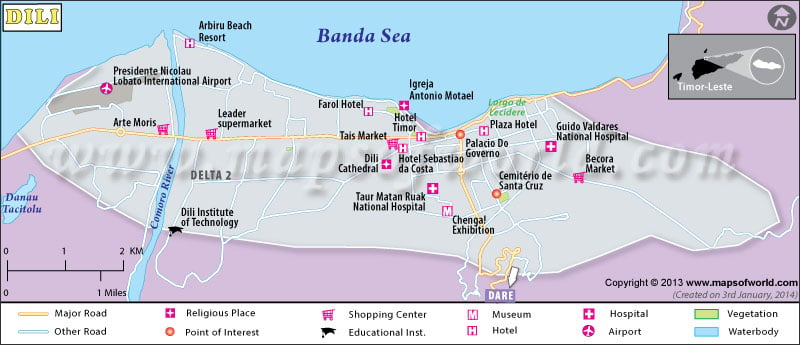About City
Dili is the capital and the chief port of East Timor. It was settled first in 1520 A.D. by the Portuguese.
As Timor was seen as a potential target during the Second World War, the Dutch and Australians occupied Timor in 1941. Dili was conquered by a small unit of the Japanese army in 1942. After the war ended, the Japanese returned Dili to the Portuguese in 1945. Timor declared its complete sovereignty in 1975. Shortly after that, in 1976, Indonesia annexed East Timor and ruled the small country till 1999 with Dili as its capital. The U.N. placed East Timor under supervision in 1999, and finally in 2002 East Timor was declared a country, with Dili as its capital. The major population of the city is Timorese and Atonese with a small percentage of Portuguese, Eurasians and Arab Muslims. A 2010 census places the population of the city at around 193,000 people. The predominant religion is that of Roman Catholicism. The two official languages of the country are Portuguese and Tetum.
Geography
The city of Dili is spread out over 48.26 sq. km, with an elevation of 38 ft. It is situated on the northern coast of the country of East Timor, the easternmost island of the Lesser Sundas. Dili is spread over the plains between the central mountains along the length of Timor and the Ombai Strait. It is the administrative headquarters of Dili district, and is divided into four sub-districts – Nain Feto, Dom Aleixo, Vera Cruz, and Cristo Rei.
Transport (How to Reach)
The only airport in the country is the Presidente Nicolau Lobato International Airport, named in honor of the freedom fighter Nicolau Lobato. This airport is located 6 km west of Dili. Sriwijaya Air, Merpati, Air North have frequent flights here.
One can drive to Dili from Mota’ain near Batugade on the Indonesian border. Buses ply passengers from Moto’ain to Dili on a regular basis. It is also possible to drive to Dili from Baucau in East Timor, which is 123 km away.
Within Dili, there is a taxi service to ferry travelers around the city. Small vans converted to carry passengers called mikrolets also function as public transport in Dili.
When to Visit
Dili has a tropical climate – hot and humid. The monsoon begins in November and ends in May, and the temperature is approximately 30°C. The rest of the year, from June to October, is summer. Locals recommend visiting between May to December, when the diving season is at its peak due to greater visibility. Whale sharks, humpback whales, manta rays, hammerhead sharks are visible during this season.
Fairs and Festivals
-
Carnival de Timor –
This is an annual festival held in April or May to celebrate music and the multi-cultural nature of the nation.
-
Easter Festivities –
Easter is celebrated with great enthusiasm in the city. Special treats are baked, and the city is decorated.
-
All Saints’ Day & All Souls’ Day –
All Saints’ Day is celebrated on 1st November, and All Souls’ Day is observed on 2nd November. These holidays are significant to the large Catholic population in the city.
-
Tour de Timor –
One of the most difficult cycling marathons in the world, the Tour de Timor is held across the country. The Tour de Timor begins and ends in Dili.
-
Dili ‘City of Peace’ Marathon –
Created as one of President Ramos Horta’s peace initiatives, the Marathon is a fun, joyful event held each year on the streets of Dili. The streets are filled with spectators cheering and supporting their friends and fellow citizens.
-
Independence Day –
20th May marks the Independence Day of the Republic of Timor Leste. Large crowds gather in public places to celebrate the hard-won independence of the country.
-
Sunset Fair –
This event is held on every Friday night at the area around the Cristo Rei Park, beginning from 20th May till 28th November. Local food and handicrafts are displayed in the market. Music and film festivals are also a part of the Sunset Fair.
Points of Interest (Places to Visit)
Dili is famous as a tourist destination for beaches, snorkeling and diving.
- One of the most popular beaches in Dili is Jesus Backside Beach in Christo Rei. Diving expeditions can be arranged near Dili and Atauro islands to see one of the few remaining untouched barrier reefs in the world.
- Approximately 7 km east of Dili, the Cape Fatucama and the Jesus statue are major tourist attractions. The spot enjoys beautiful beaches and amazing views of the snow-capped mountains.
- It is worth visiting Ramalau which is the highest mountain in Timor.
- Resistance Museum celebrates the independence movement & the 25 year struggle for sovereignty of the people of East Timor.
- Dare Museum was built to commemorate the Timorese experience of WWII. A memorial to the Australian unit that resisted the Japanese threat during the war is also part of the Dare Museum.
- Tais Market is set up each week to market and distribute the unique fabric produced in Dili. The Alola Foundation sells sculpture, handicrafts and regional curios to support women and children of the poor sections of the city.
Accommodation
There are a number of hotels in Dili that offer accommodation facilities at a variety of rates. Four starred hotels like Hotel Timor, Beach Garden Hotel and Excelsior Resort are on the beach front. Most hotels are fairly close to the airport. Luxury hotels like Hotel The Ramelau boast of swimming pools, lush green tennis courts and fitness centers. Some hotels like Bemori Apartments and Katua’s Hotel do not accept credit cards, while others levy an extra charge on the use of credit/international debit cards. Accommodations like East Timor’s Backpackers Hostel provide only the very basic necessities at an affordable rate. The staff is British and Timorese, which is why communication is smooth and easy.

 East Timor Independence Day
East Timor Independence Day